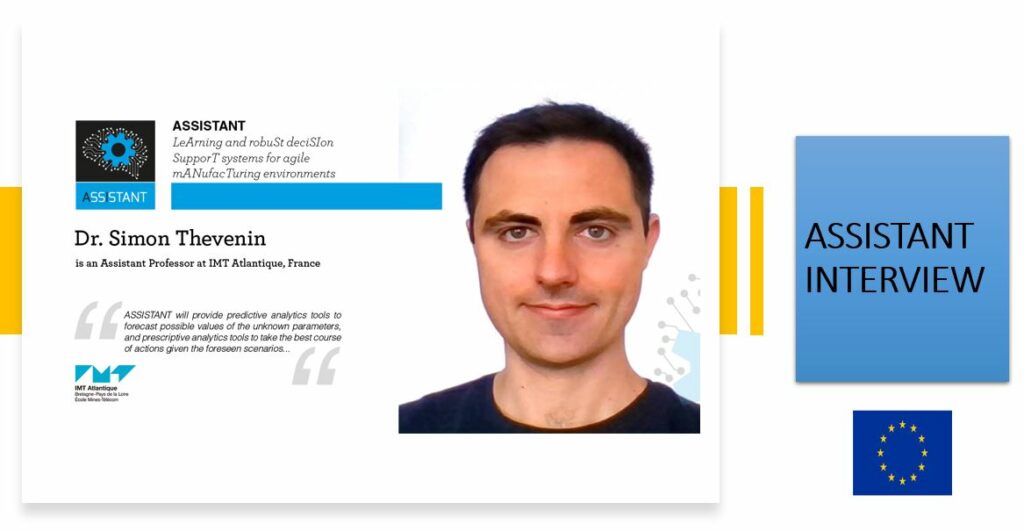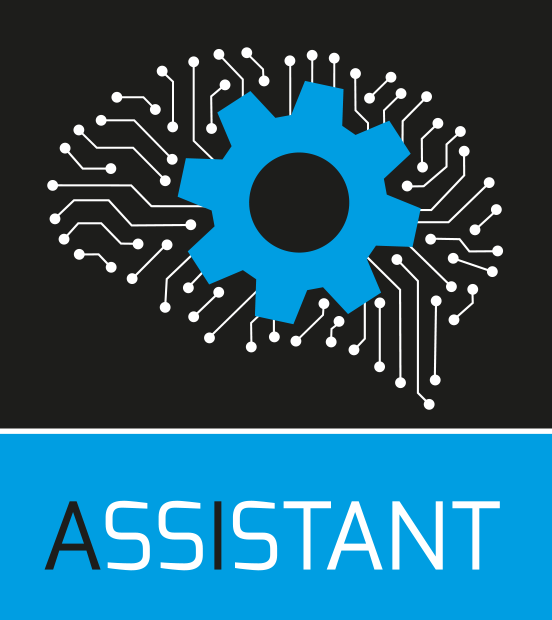
Dr. Simon Thevenin is an Assistant Professor (not to be confused with ASSISTANT project) at IMT Atlantique.
Before joining IMT Atlantique, Dr Simon was a research assistant at the University of Geneva, expert in algorithms at Delmia Quintiq and postdoctoral associate at IVADO and JDA Labs. His scientific achievements include the development of intelligent production planning solutions for manufacturing, and approaches for data-driven production planning under uncertainties. Dr Simon holds a master’s degree in databases and artificial intelligence from the University of Burgundy and a Ph.D. from the University of Geneva. His Ph.D. Thesis focused on metaheuristics for production planning problems.
Félicien : Simon, what is the meaning of ASSISTANT ?
Simon : ASSISTANT means LeArning and robuSt deciSIon SupporT systems for agile mANufacTuring environments
Félicien : What is adaptive manufacturing ?
Simon: An adaptive production system is a manufacturing or assembly line where the resources and equipment can be easily rearranged to adjust to the production requirement. In the academic literature, there exists a precise definition of some production systems, such as the reconfigurable manufacturing systems, or flexible assembly lines, … Within ASSISTANT, we use the term adaptive manufacturing as a
generalization of these different types of manufacturing systems that can easily adapt to various situations.
Félicien: How adaptive manufacturing is relevant for today’s industries?
Simon: There is a trend toward mass customization, we even talk about mass individualization nowadays. In this context, companies are increasing the size of their product assortments, and they are frequently launching new products. The manufacturing systems must adapt quickly to new requirements, and to the changes in the demand of the different items.
Félicien: What are the challenges of building adaptive manufacturing?
Simon: A first challenge is to build a system with the right level of flexibility. A too flexible system is too expensive. Companies must foresee the possible situations the manufacturing system might face, and they must then design their production/assembly line accordingly. Second, with many end items, the production system becomes difficult to manage and operate. In addition, as the system is constantly changing, many parameters are difficult to predict accurately. Third, the lack of regularity in the production system, makes it very difficult to ensure product and process quality. Finally, workers often become hyperdynamic which creates stress and ergonomic issues.
Félicien: What does ASSISTANT do and how ASSISTANT solve the problem of adaptive manufacturing?
Simon: ASSISTANT aims to provide a set of AI-based intelligent digital twins that combine machine learning, simulation, domain model, and optimization to make decisions at every step of manufacturing. The tools will help planners to design the production lines, plan the production, operate the production system, improve process tuning, and control the system. ASSISTANT aims to make efficient decisions while ensuring product quality, safety, and well-being of workers, and managing the various sources of uncertainty. This software collects data from sensors and various software, automatically cleans the data, and integrates them thanks to domain models. Based on this data, ASSISTANT will provide predictive analytics tools to forecast possible values of the unknown parameters, and prescriptive analytics tools to take the best course of actions given the foreseen scenarios. These tools aim to assist the decision-maker, but this later remains in charge of the decision. ASSISTANT will extend the generative design concept to all manufacturing decisions. With generative design, the user can enter filtering constraints in the decision modules until the tool suggests satisfactory decisions.
Félicien: How other industries, except the project consortium, can benefit from the ASSISTANT project?
Simon: The tools designed in ASSISTANT (for process planning, production planning, scheduling, and real-time execution) will be tested on three industrial use cases. Nevertheless, they will be applicable to a wide range of manufacturing environments and can benefit other industries as well. ASSISTANT will release reports and plan several workshops (targeted towards academics, technology providers, and manufacturers) explaining our main findings regarding how to design, plan, and operate adjustable manufacturing systems appropriately. In addition, three demonstrators (each focusing on a specific subset of tools) will be released for industrial to discover our main results.
